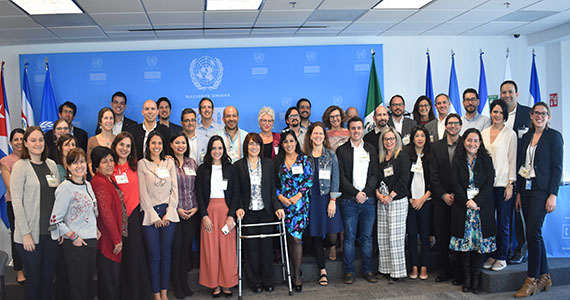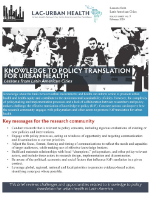How can urban health research drive policy action?
SALURBAL’s latest policy brief, “Knowledge to Policy Translation for Urban Health,” explores ways researchers can support evidence-based policies and interventions.
Posted on
February 27, 2020
By: Katy Indvik, MSc and Andrea Bolinaga, MA
SALURBAL Project
In the context of a rapidly urbanizing world, understanding the links between urban environments and health can drive action to build healthier, more equitable, and more sustainable cities. Scientific research increasingly focuses on these connections, but effective translation of knowledge about the ways the physical and social environment in cities affects people’s health and well-being is needed.
The SALURBAL project is committed to communicating results about urban environments and health to decision-makers across Latin America. The team develops activities and materials to ensure that project findings are relevant and accessible.
In 2018, the Wellcome Trust-funded project hosted a Knowledge-to-Policy Forum in Mexico City to present preliminary results and discuss research and policy priorities with urban health actors from across Latin America.

Policy-making processes are complex and vary greatly. Knowledge to policy translation also confronts many obstacles, which can include a lack of capacity and structures to support relevant research, a lack of capacity for interpreting and applying research, ineffective structures for connecting researchers and policymakers, ineffective communication, and competing incentives and interests.

Nevertheless, the research community can take concrete steps to engage with these processes and improve knowledge to policy translation for urban health. The latest policy brief in SALURBAL’s Lessons from Latin American Cities series, “Knowledge to Policy Translation for Urban Health,” highlights recommendations for researchers, including:
- Design and conduct research that is relevant to policy concerns
- Engage with policy processes and identify windows of opportunity
- Adjust communication strategies to different audiences
- Build and maintain relationships with actors who are close to decision-making processes
- Understand the political, economic, and social factors that influence policy-making


SALURBAL’s latest policy brief highlights other examples of knowledge to policy translation from across the region:
Want to learn more about ways to improve knowledge to policy translation for urban health? Download the latest policy brief in SALURBAL’s Lessons from Latin American Cities series, “Knowledge to Policy Translation for Urban Health.”